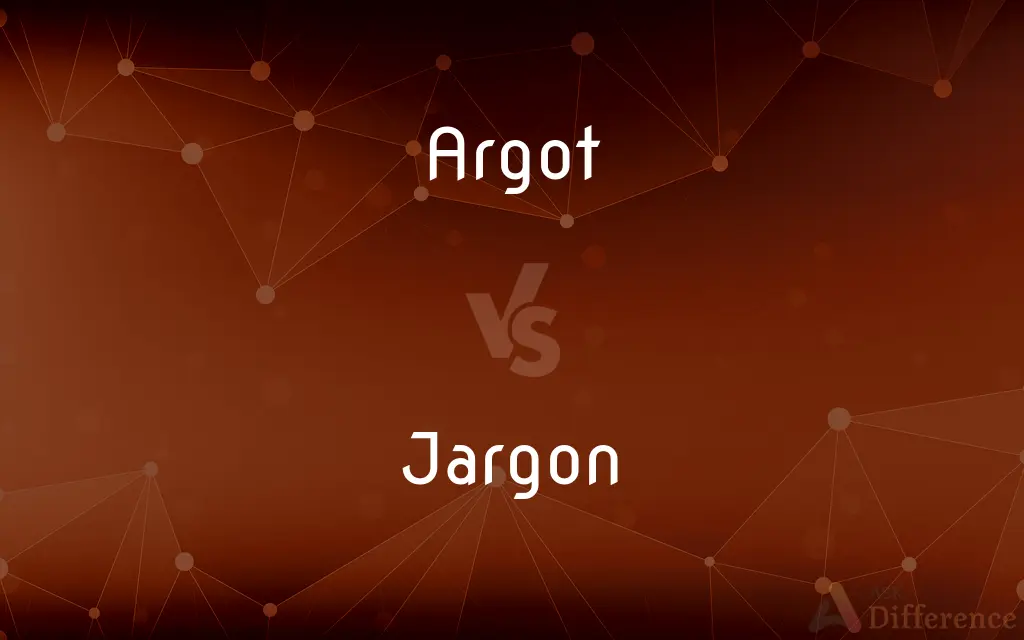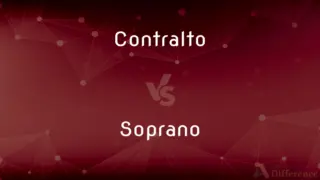Argot vs. Jargon — What's the Difference?
By Tayyaba Rehman & Urooj Arif — Updated on March 12, 2024
Argot is a secret language used by a particular group, mainly to keep communication private, while jargon is specialized terminology associated with a specific field of interest or profession.

Difference Between Argot and Jargon
Table of Contents
ADVERTISEMENT
Key Differences
Argot is a special language developed and used by specific social groups, such as thieves, to keep their communication incomprehensible to outsiders. It serves as a marker of identity and solidarity within the group. Whereas jargon is the technical vocabulary or specialized terms used within a particular profession, discipline, or hobby, facilitating precise communication among experts but potentially alienating to non-specialists.
Argot often evolves from the need for secrecy and can include slang, coded phrases, and modified language structures. It helps in maintaining a distinct cultural or group identity. On the other hand, jargon develops out of necessity for accuracy and efficiency in communication within specific contexts, such as medical, legal, or technological fields, where precision is crucial.
While argot is primarily associated with covert or underground aspects of society, jargon is typically linked to academic, professional, or enthusiast groups. The purpose of argot is to exclude, whereas jargon aims to include those within the field or interest area by providing a common language.
Argot's vocabulary might change rapidly to maintain secrecy and adapt to shifting cultural or group dynamics. In contrast, jargon can be more stable, evolving primarily through advancements in the specific field or area of interest it serves.
Although both argot and jargon serve as forms of group language, the intent behind their use significantly differentiates them. Argot protects against external understanding, while jargon seeks to create an effective means of communication among insiders, often at the risk of obscuring meaning for outsiders.
ADVERTISEMENT
Comparison Chart
Purpose
To conceal meaning from outsiders
To facilitate precise communication within a field
Users
Members of specific social or subcultural groups
Professionals or enthusiasts in a specific domain
Nature
Secretive, often changes to maintain secrecy
Specialized, evolves with the field
Main Function
Maintains group identity and exclusivity
Promotes efficiency and accuracy in communication
Accessibility
Intentionally difficult for outsiders to understand
Can be challenging for non-specialists but learnable
Compare with Definitions
Argot
Cultural Identity Marker.
The argot used by the youth subculture sets them apart from mainstream society.
Jargon
Can be Exclusive but Learnable.
Although full of jargon, academic papers are accessible with study.
Argot
Uses Slang and Codes.
Their argot is rich in slang terms that are cryptic to outsiders.
Jargon
Facilitates Expert Communication.
Legal jargon allows lawyers to discuss complex issues precisely.
Argot
Secret Language of a Group.
Thieves' argot is designed to be undecipherable by the police.
Jargon
Develops with the Field.
New technology introduces new jargon in the IT sector.
Argot
Evolves for Secrecy.
Argot changes rapidly to prevent outsiders from catching on.
Jargon
Aims to Include Insiders.
The use of jargon in a scientific community fosters a sense of belonging.
Argot
Aims to Exclude.
The use of argot ensures that only insiders understand the conversation.
Jargon
Specialized Terminology in a Field.
Medical jargon includes terms like hypertension for high blood pressure.
Argot
A specialized vocabulary or set of idioms used by a particular group
Thieves' argot.
Jargon
Jargon is the specialized terminology associated with a particular field or area of activity. Jargon is normally employed in a particular communicative context and may not be well understood outside that context.
Argot
A secret language or conventional slang peculiar to thieves, tramps and vagabonds.
Jargon
The specialized language of a trade, profession, or similar group, especially when viewed as difficult to understand by outsiders
A crime novel that uses a lot of police jargon.
Argot
The specialized informal vocabulary and terminology used between people with special skill in a field, such as between doctors, mathematicians or hackers.
The conversation was in the argot of the trade, full of acronyms and abbreviations that made no sense to the uninitiate.
Jargon
Nonsensical or incoherent language
"Your description will be considered as mere jargon by every man of sense" (Alexander Hamilton).
Argot
A secret language or conventional slang peculiar to thieves, tramps, and vagabonds; flash.
Jargon
A hybrid language or dialect; a pidgin. Not in technical use.
Argot
A characteristic language of a particular group (as among thieves);
They don't speak our lingo
Jargon
To speak in or use jargon.
Jargon
(uncountable) A technical terminology unique to a particular subject.
Jargon
(countable) A language characteristic of a particular group.
Jargon
(uncountable) Speech or language that is incomprehensible or unintelligible; gibberish.
Jargon
To utter jargon; to emit confused or unintelligible sounds.
Jargon
Confused, unintelligible language; gibberish.
Jargon
An artificial idiom or dialect; cant language; slang.
The jargon which serves the traffickers.
Jargon
A variety of zircon. See Zircon.
Jargon
To utter jargon; to emit confused or unintelligible sounds; to talk unintelligibly, or in a harsh and noisy manner.
The noisy jay,Jargoning like a foreigner at his food.
Jargon
A characteristic language of a particular group (as among thieves);
They don't speak our lingo
Jargon
A colorless (or pale yellow or smoky) variety of zircon
Jargon
Specialized technical terminology characteristic of a particular subject
Common Curiosities
What is argot?
Argot is a secret language used by specific groups to keep their communication private and maintain group identity.
What is jargon?
Jargon is specialized terminology associated with a specific profession or interest, intended to facilitate precise communication.
How does argot differ from jargon?
Argot is secretive and used for exclusion, while jargon is specialized and aims at effective communication within a field.
How do new terms enter a field's jargon?
New terms typically enter a field's jargon through technological advances, research developments, or evolving practices within the profession.
Can jargon create barriers to understanding?
Yes, jargon can create barriers for those outside the profession or field, making it difficult for them to understand the specialized terms.
How is argot learned?
Argot is learned through immersion in the group or culture that uses it, often as a sign of membership or insider status.
Is it possible for jargon to become mainstream language?
Yes, some jargon can become part of the mainstream language as the public becomes more familiar with the concepts.
What role does jargon play in academic writing?
In academic writing, jargon serves to communicate complex ideas precisely and efficiently among scholars and researchers.
Can jargon be considered a form of argot?
No, because jargon is not intended to be secretive or exclusive; its purpose is to enhance communication efficiency in specific contexts.
Why do people use argot?
People use argot to conceal their communication from outsiders and strengthen their group identity.
Can anyone learn jargon?
Yes, with appropriate study and immersion in the field, anyone can learn the jargon of a particular domain.
Why is jargon important in professional fields?
Jargon is important for conveying complex ideas precisely and efficiently among experts in the field.
Is argot limited to criminal groups?
While often associated with criminal groups, argot can be used by any group seeking to hide their communication.
Can the use of argot or jargon be problematic?
Both can be problematic: argot by intentionally excluding outsiders and jargon by inadvertently creating barriers to understanding for those not in the field.
Do argots evolve over time?
Yes, argots evolve rapidly to maintain secrecy and adapt to new cultural or group dynamics.
Share Your Discovery

Previous Comparison
Raffle vs. Waffle
Next Comparison
Contralto vs. SopranoAuthor Spotlight
Written by
Tayyaba RehmanTayyaba Rehman is a distinguished writer, currently serving as a primary contributor to askdifference.com. As a researcher in semantics and etymology, Tayyaba's passion for the complexity of languages and their distinctions has found a perfect home on the platform. Tayyaba delves into the intricacies of language, distinguishing between commonly confused words and phrases, thereby providing clarity for readers worldwide.
Co-written by
Urooj ArifUrooj is a skilled content writer at Ask Difference, known for her exceptional ability to simplify complex topics into engaging and informative content. With a passion for research and a flair for clear, concise writing, she consistently delivers articles that resonate with our diverse audience.
















































